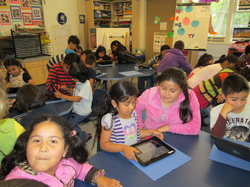
by Martha McCoy
iPads in Kindergarten didn't make any sense to me when I first heard I would be teaching kindergarten in a pilot program that provided one iPad per student. It seemed like a misuse of valuable resources and I thought using iPads would deprive kindergartners of 'real' play-based learning. I was worried about too much screen time and lack of social interaction if kids were 'plugged in' so young. Would using iPads inhibit their communication skills? What about their writing skills? Would they just 'play games' and not really learn anything? What about the rest of our school?
It didn't take long before I announced to the world that 'Every student should have access to an iPad!' The portable touch screen technology makes learning accessible to everyone, irregardless of literacy skills, language and background. I watched students listen to and interact with digital stories, play phonics games, create stories, practice their letters over and over, and do puzzles on their iPads with just two days of instruction. This was impressive but what was even more remarkable was that students showed great persistence and ingenuity in figuring out the apps. They were undaunted when faced with failure! They were willing to take risks, experiment, and use their prior knowledge independently. While using iPads, the ususal subjective judgement or praise by the teacher about a student's failure or success was nonexistent. I was watching children's brains in action. I witnessed a high level of motivation and problem solving as children helped each other and shared their work...and this was just the beginning.
DOLLARS WELL SPENT
Think about it. People do not question investing large sums of money in high school intervention programs to 'close the achievement gap'. But Kindergarten?
The truth is you get a lot more BANG for the BUCK if you intervene early by building English vocabulary, math and literacy skills before the age of 5.
iPads in Kindergarten didn't make any sense to me when I first heard I would be teaching kindergarten in a pilot program that provided one iPad per student. It seemed like a misuse of valuable resources and I thought using iPads would deprive kindergartners of 'real' play-based learning. I was worried about too much screen time and lack of social interaction if kids were 'plugged in' so young. Would using iPads inhibit their communication skills? What about their writing skills? Would they just 'play games' and not really learn anything? What about the rest of our school?
It didn't take long before I announced to the world that 'Every student should have access to an iPad!' The portable touch screen technology makes learning accessible to everyone, irregardless of literacy skills, language and background. I watched students listen to and interact with digital stories, play phonics games, create stories, practice their letters over and over, and do puzzles on their iPads with just two days of instruction. This was impressive but what was even more remarkable was that students showed great persistence and ingenuity in figuring out the apps. They were undaunted when faced with failure! They were willing to take risks, experiment, and use their prior knowledge independently. While using iPads, the ususal subjective judgement or praise by the teacher about a student's failure or success was nonexistent. I was watching children's brains in action. I witnessed a high level of motivation and problem solving as children helped each other and shared their work...and this was just the beginning.
DOLLARS WELL SPENT
Think about it. People do not question investing large sums of money in high school intervention programs to 'close the achievement gap'. But Kindergarten?
The truth is you get a lot more BANG for the BUCK if you intervene early by building English vocabulary, math and literacy skills before the age of 5.
 RSS Feed
RSS Feed
